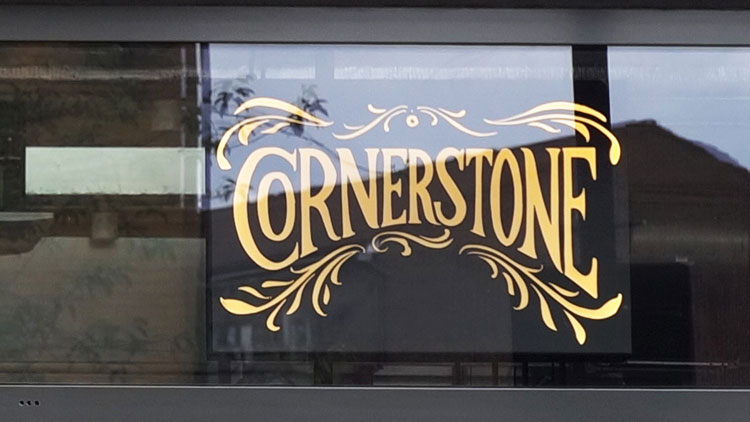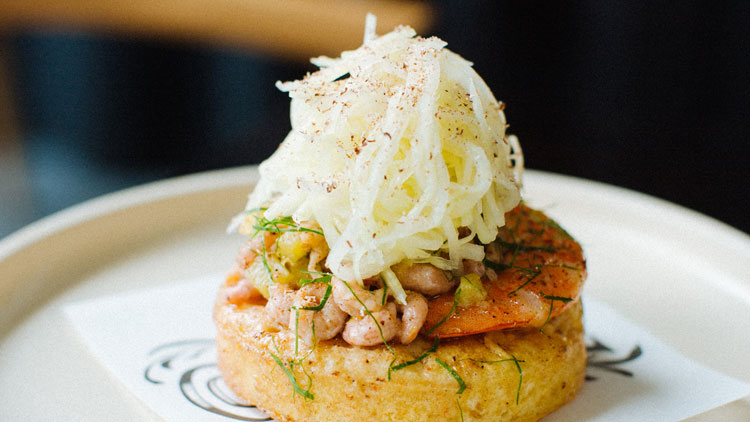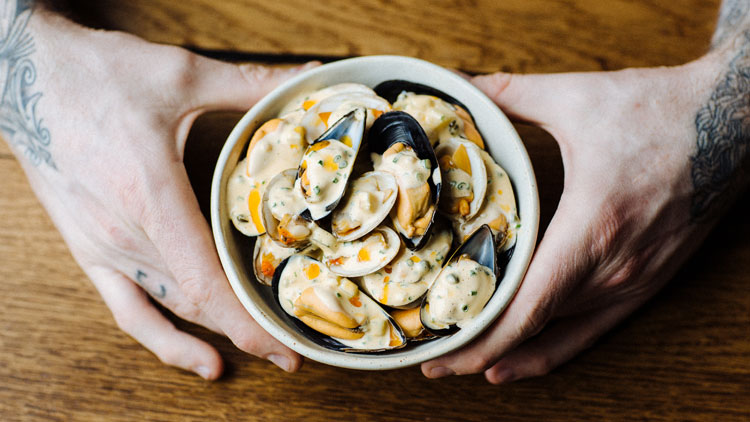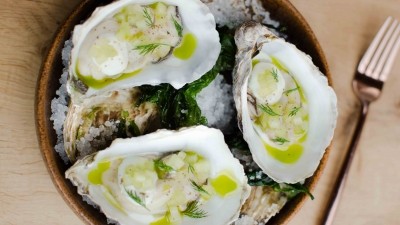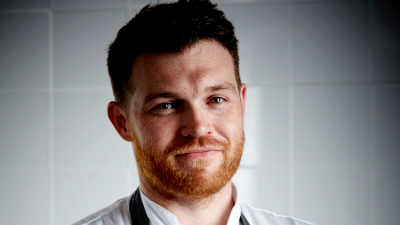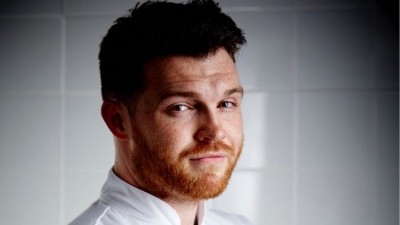Cornerstone's Tom Brown on his first year flying solo
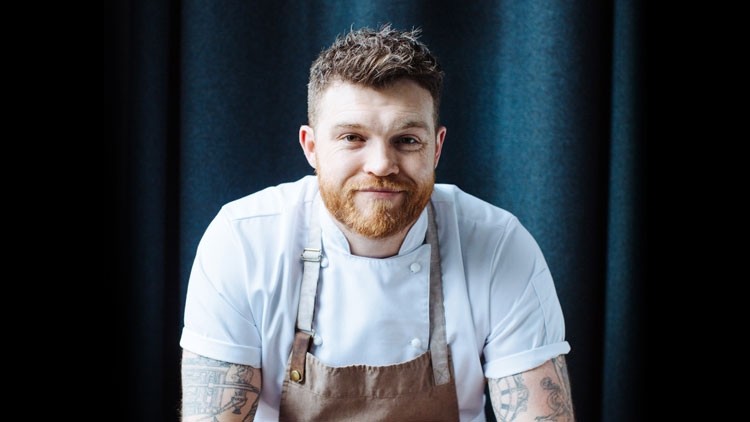
You’re a year in. How’s it been?
It’s been such a roller coaster. I know it’s a cliché, but it’s so up and down because I’m so invested in it. When you’ve got a job as a professional chef you do your best and it matters to you, but with your own restaurant it’s much more personal. When you have a good day you’re elated, but if one thing goes bad it’s suddenly doom and gloom. With your own money you’re always watching the till, and it can be painful when you suddenly have to shell out for something unexpected. It has been amazing though. The ups are what make it. It’s genuinely a dream come true to come into the restaurant every day and know it’s mine.
What expectations did you have for Cornerstone?
I wanted it to be not too dissimilar to what I had already been doing as a head chef in a well-established place [Nathan Outlaw at The Capital]. But it’s a completely different role and it’s a bit of a blur. It’s different to anything I have done before and there are so many things since opening that I have had no point of reference for – I can’t tell you the number of times I’ve had to say ‘can you explain that to me like I’m an idiot’. I had never had any previous experience of dealing with builders or solicitors or anything to do with the bank. We’ve come out of it OK but there have been some tricky times.
How tricky?
Two days into opening our finance payments came out and put us £6,000 overdrawn because all the money we had taken on card payments had yet to clear. The bank rang up to tell me to bring the account into credit right away. I had to ask my girlfriend to pay it out of her savings just for the day before I could pay her back. I have no qualms in saying how naive I was about everything and how steep a learning curve it was. I’m good at admitting my own stupidity.
What has been the biggest challenge you’ve faced in the first year?
Staffing at the start was hard. I overestimated what was reasonable for people to do. Because I was happy to work five double shifts in a row, I expected other people to as well, and we went through a couple of chefs at the start. I wasn’t running people into the ground but I was putting too much on people’s shoulders when they were brand new. Since then we’ve increased the number of chefs and brought in a proper pastry chef, which has been a godsend as not only has it relieved everyone’s workload but has put us on another level in terms of food. The biggest challenge is getting staff to buy into Cornerstone. I want it to be somewhere people love to work and be inspired because I always had that with Nathan [Outlaw], and before that with Paul Ripley. A year down the line we’ve got a team that really wants to be here and make the restaurant even better tomorrow than it is today.
What has changed since you opened?
I knew I would tweak a lot because it was my first restaurant and I didn’t really know what I was doing. We toyed with opening on Sunday and closing Monday and Tuesday instead, but with the fish it was too much to juggle, we either had loads left over or ran out. We are now closed Sunday and Monday and for Tuesday lunch. Also, when we opened I felt like we needed to have a broad menu so we did quite bit of meat and dishes that were vegetable based as that was a trend at the time, but they just petered out. My epiphany really came when Claude Bosi came in for lunch about two months after opening and I asked him if we could improve anything. He said he didn’t understand why we bothered with the meat and said our strength was with fish so we should bite the bullet and just serve fish. It was a real confidence boost that someone like Claude thought we were that good. I hadn’t really cooked meat for six years so I was happy to admit it was not my strength – we could do some nice dishes but there are better meat cooks out there.
Can you remember your first service?
The first one was a freebie for friends and family. We didn’t do a soft launch because if you charge 50% you’re either apologising that you’re not good enough or you’re losing money. It started off well but then we set the oven on fire and it turned to chaos. But it was nice to know we had got that under our belt with friends. During the first couple of days we were like headless chickens, but by day five it felt like we’d been here for months.
How has the food evolved?
At the start, dishes would go on the menu and then I would strip them back, but they are simpler from the start now. The reason I worked with Nathan for so long is I love to put a dish in front of someone and say ‘find a fault with that’. When a dish has got 20 or 30 components it gets muddled and you can often find fault, but I love clean food. I want people to taste a scallop and butter and neither can be any better than they are. It’s food you can relate to and understand that it’s a beautiful piece of fish with a lovely sauce. The concept is still sharing but we used to send every dish on its own, now we put the food down in little waves so you get the cold dishes at the same time. I love eating like this, which is why Sabor [in Mayfair] is my favourite restaurant. What we do at Cornerstone is easy to like – you can come and have a big bowl of chicken butter sauce and be happy. The restaurants that have stood the test of time do that.
Does Cornerstone have many regular customers?
It’s mad that we’ve been open 11 months and some people have been in over a dozen times. One of my most regular customers came in because of the name [Cornerstone takes its name from an Arctic Monkeys song] and because we were playing their latest album. He later came back for dinner and I now go to his house for Sunday lunch and we’ve seen the Arctic Monkeys together. I don’t know how to be a real business person, I like making friends. When people come in I give them a hug.
What are your aspirations for the restaurant?
I want to approach it with the same mindset I’ve always had – how can we make the food better, the service more inviting and give people a better experience? I’d like Cornerstone to be an established restaurant and that in 10 years’ time people are talking about it like they do of institutions like St John or Lyle’s. I’d like to be part of this community for a long time. But the immediate goal is to still be open in a year’s time.
And what about getting a Michelin star that you missed out on last year?
Don’t get me wrong, I really, really want a Michelin star, what chef doesn’t? We missed out last year but if I don’t get it this year I’m not going to change anything or worry about what an inspector wants. I like to think we’re a very good restaurant and that the customer comes here and has a good time. I want to maintain that openness and lack of ego.
If you were to open Cornerstone tomorrow, what would you do differently?
We’ve changed so many things but if I could turn back the clock I wouldn’t open the restaurant as it is now. That journey of making those mistakes and adjusting those things shapes you as a person. You’ve got to break a few eggs to make an omelette and I’d do it all over again.
What advice would you give to anyone starting their own restaurant?
I’ve always been a big believer in surrounding myself with people who are better than me. Francesca who works in the office runs this place; she’s more important to Cornerstone than I am, she makes it happen. Our head chef Christian does the grunt work, and the front of house team is invaluable. I’m happy to let people be better at those things than I am so whenever things have gone wrong I’ve got a very solid support network. You need to put trust in the right people and allow them to take their strengths and cover your weaknesses. And to have someone like Nathan at the end of the phone is invaluable.
Are any of the opening team still with you?
There’s three of us – me, Christian and Francesca. Eugene our kitchen porter joined us in the first week. We’ve had a lot of changes but we’re settled now.
What has been your biggest learning from opening your own place?
Budget. Anyone who opens a restaurant and doesn’t think they are going to go massively over budget is a little bit naive. We started with a budget of £100,000 and in the end it cost us £140,000. Taking into account the finance, the restaurant ended up costing around £400,000 including my living costs for six months while we set it up, which is pretty good. But if I was doing it again I’d be a lot more wary of budget.
Any plans to open another restaurant?
I’d like to establish Cornerstone to a point where I could look at doing other things, it’s a big world out there and gastronomy is such a huge area. I go to little oyster bars in Paris and fancy doing one of them over here, or a big place that serves whole fish. But this is the flagship.
This is a web version of an article that first appeared in the April issue of Restaurant magazine, the leading title for the UK's restaurant industry. For more features, comment, interviews and in-depth analysis of the restaurant sector subscribe to Restaurant magazine here.
